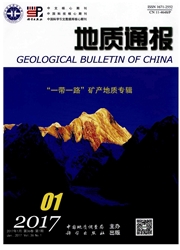

 中文摘要:
中文摘要:
对龙门山褶皱冲断带北段前锋带至四川盆地边缘的川西北地区进行了磁组构研究。在江油和广元之间,沿着垂直于龙门山构造走向的4条采样路线,在18个采样点钻取了173个定向样品,样品采自侏罗纪和白垩纪砂岩及粉砂质泥岩。综合分析表明川西北磁组构反映的是新生代的变形,并在研究区域内总结出了3类磁组构:沉积磁组构、初始变形磁组构和铅笔状磁组构。除沉积磁组构之外的所有采样点样品的/(1优势方向都是NE—SW向,说明研究区域的最大主压应力方向为NW—SE向。主要来源于龙门山褶皱冲断带。在垂直于龙门山褶皱冲断带构造走向上,从四川盆地到龙门山前锋,磁组构由沉积磁组构逐渐变为初始变形磁组构,直至铅笔状磁组构,说明盆地内部应变十分微弱,靠近造山带应变逐渐增强,且侏罗纪、白垩纪以来研究区的构造变形主要集中在造山带边缘或者还未传递到盆地内部。
 英文摘要:
英文摘要:
An investigation of magnetic fabrics has been carried out in northwestern Sichuan from the front zone in the north- ern segment of the Longmen fold-thrust belt to the margin of the Sichuan basin. Between Jiangyou and Guangyuan, 173 oriented specimens were obtained from 18 well sites along four sampling routes perpendicular to the strike of the Longmen belt. All the specimens were taken from Jurassic and Cretaceous sandstones and silty mudstones. Integrated analysis indicates that the magnetic fabrics in northwestern Sichuan reflect Cenozoic deformation. There are three types of magnetic fabrics in the study area: sedimentary magnetic fabric, initial deformation magnetic fabric and pencil-shaped magnetic fabric. Except the sites showing sedimentary magnetic fabrics, the preferred orientation of K1 at all the specimen sites is NE-SW, which indicates that the maximum principal compressional stress in the study area is oriented in a NW-SE direction, which shows that the stress mainly came from the Longmen fold-thrust belt. Along four sampling routes perpendicular to the strike of the Longrnen belt, the sedimentary magnetic fabric changes to initial deformation magnetic fabric and finally to pencil-shaped magnetic fabric from the Sichuan basin to the front of the Longmen Mountains. This suggests that the strain in the Sichuan basin is feeble and becomes strong progressively near the orogen, and that since the Jurassic and Cretaceous, the tectonic deformation in the study area mainly took place at the edge of the orogen or has not been transferred to the Sichuan basin.
 同期刊论文项目
同期刊论文项目
 同项目期刊论文
同项目期刊论文
 期刊信息
期刊信息
